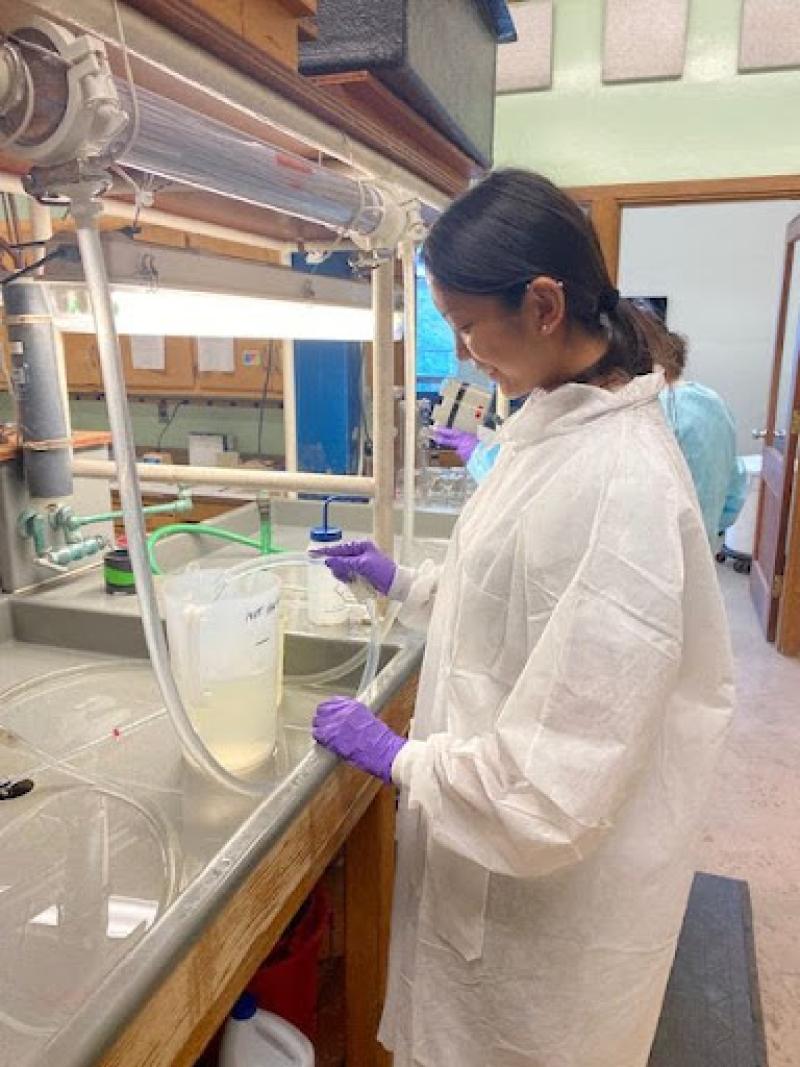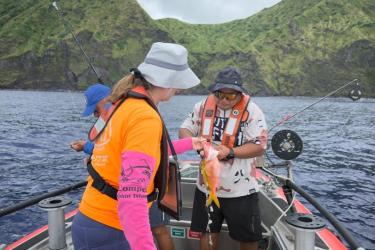This summer, the NOAA Fisheries Office of Aquaculture hosted two summer scholars, who helped advance NOAA’s aquaculture work and stakeholder outreach.
Rose Leeger is a college junior studying Marine Biology as well as Environmental Science and Biology. She joined the Office of Aquaculture’s communications team through the EPP/MSI Undergraduate Scholarship program. She spent the summer collaborating with staff from the Milford Lab to communicate and increase outreach efforts around the lab’s development of the OY15 probiotic. These efforts included assisting in the lab, and writing a feature story to educate stakeholders about the potential for probiotic benefits in oyster hatcheries.
Benjamin Hurley is a college senior studying Marine Science. He connected with the Office of Aquaculture’s policy team through the Ernest F. Hollings Undergraduate Scholarship program. He spent the summer working on updating and expanding a permitting inventory of aquaculture policy in coastal states for public reference. The permitting guide provides aquaculture farmers with at-a-glance contact information for various government agencies.
What motivated you to apply for an internship with the NOAA Office of Aquaculture?
Rose
Since my sophomore year of high school, applying for a NOAA internship has always been a goal of mine. I knew I wanted to study marine biology ever since I was a student summer intern at the National Aquarium in Baltimore. I had limited academic experience with aquaculture, but was excited to learn more about the research being conducted at the labs around the country. Once I had my interview with my mentors and realized how willing they were to help me expand my knowledge, I knew it was the perfect fit for both of us.
Benjamin
I’ve always been very interested in aquaculture as a field, and I gravitated toward the policy sphere rather than research. When I got the Hollings fellowship, I read through their list of hundreds of project choices and did not see a lot of opportunities concerning either aquaculture or policy, so the natural choice was to reach out to the Office of Aquaculture directly to ask if I could work on a project with them. I’m excited they said yes!
Did you learn anything about aquaculture that surprised you?
Rose
I was shocked to learn how low the United States ranked in global aquaculture production. That’s what made my project on oyster probiotic work so interesting—I could see a real-world benefit to the NOAA research being conducted for growers around the country. I spent hours on the Office of Aquaculture website reading up on news and current research being conducted. The inclusion of tribal and indigenous cultural perspectives was fascinating as well. It helps readers understand the larger social interactions of aquaculture beyond just the economic return.
Benjamin
When I was updating our inventory of shellfish policy, I was able to find a lot of readily accessible information about oyster aquaculture programs in just about every coastal state. Then I moved on to the seaweed and finfish policy, and I immediately hit a wall. I knew aquaculture was still developing in the United States. But the degree to which many states lacked regulatory infrastructure to support the industry (outside of shellfish) surprised me. That caused me to reshape how I went about discussing permitting with states for those industries. It very much informed my perspective on why this kind of education and information sharing on permitting is so essential to help grow aquaculture in the areas that still have gaps.
How does aquaculture tie in with your course of study? Would you consider a career on the water?
Rose
On the water, in the water, anywhere near the water, count me in! I hope to pursue my Ph.D. after my undergraduate degree, with a specific focus on ecology and evolution of both marine and freshwater ecosystems. The connections I made as an intern have been a huge help with planning for graduate school. Everyone I had meetings with, whether it was a one-on-one coffee chat or a 25 person staff meeting, was so willing to help me make connections with people they knew to help me succeed. Without a doubt, I would definitely love to work with the Office of Aquaculture again.
Benjamin
I’ve always wanted to study marine science. Aquaculture presents both environmental and regulatory challenges and benefits. It dovetails very nicely with the education I’ve pursued in both the marine ecology and the marine management sectors. As I look toward a career in regulation and policy, I wouldn’t mind doing some field work on the water at some point. The ocean is why I got interested in this to begin with.
What new skills did you gain from this experience?
Rose
Visiting the Milford Lab allowed me to experience microbiology techniques in a real world setting. I had spent almost half my internship time reading every article and research paper on oyster probiotic work. Being able to go to the lab in person was better than anything I could have imagined. I’m forever grateful for the trust Diane Kapareiko at the Milford Lab had in me once I arrived. In less than a week, I was able to feed the oyster larvae the different algae food. I even got to handle and prepare the probiotic, OY15, to be administered to the larvae.
Benjamin
My understanding of the regulatory process and the terminology and concepts necessary to work within that realm has definitely expanded. I also have never had to communicate and coordinate with so many state representatives simultaneously. This experience was vital to learning how to track down and coordinate all the necessary parties to make a project like the permitting report happen.
What is one thing you learned this summer that you would like everyone to know?
Rose
One message that was relayed by many of my mentors both from the Office of Aquaculture and the Milford Lab was that when presenting, you’re always telling a story. The incredible research being conducted needs to be understood and shared with people of all backgrounds, not just scientists. Keep asking questions and never forget to say thank you after a coffee chat or meeting.
Benjamin
Interest from stakeholders and development of state aquaculture programs often go hand in hand. Many state coordinators say that they couldn’t really develop a regulatory structure until they had someone apply. Although it seems paradoxical, if we want increased regulation efficiency in order to encourage interest in aquaculture, first we need to educate potential growers to express their interest to their state and coastal managers.
Both Rose and Ben’s contributions this summer helped the Office of Aquaculture provide accurate, up-to-date, and accessible aquaculture outreach materials to stakeholders. The student and mentor efforts this summer are helping educate the public and train the next generation of aquaculture innovators and ocean stewards.
Fostering Diversity and Inclusion in Aquaculture
Further Reading
On the Rocks? A Bartender’s Guide to Scientific Success
Careers at NOAA
Internships and More at NOAA Fisheries



